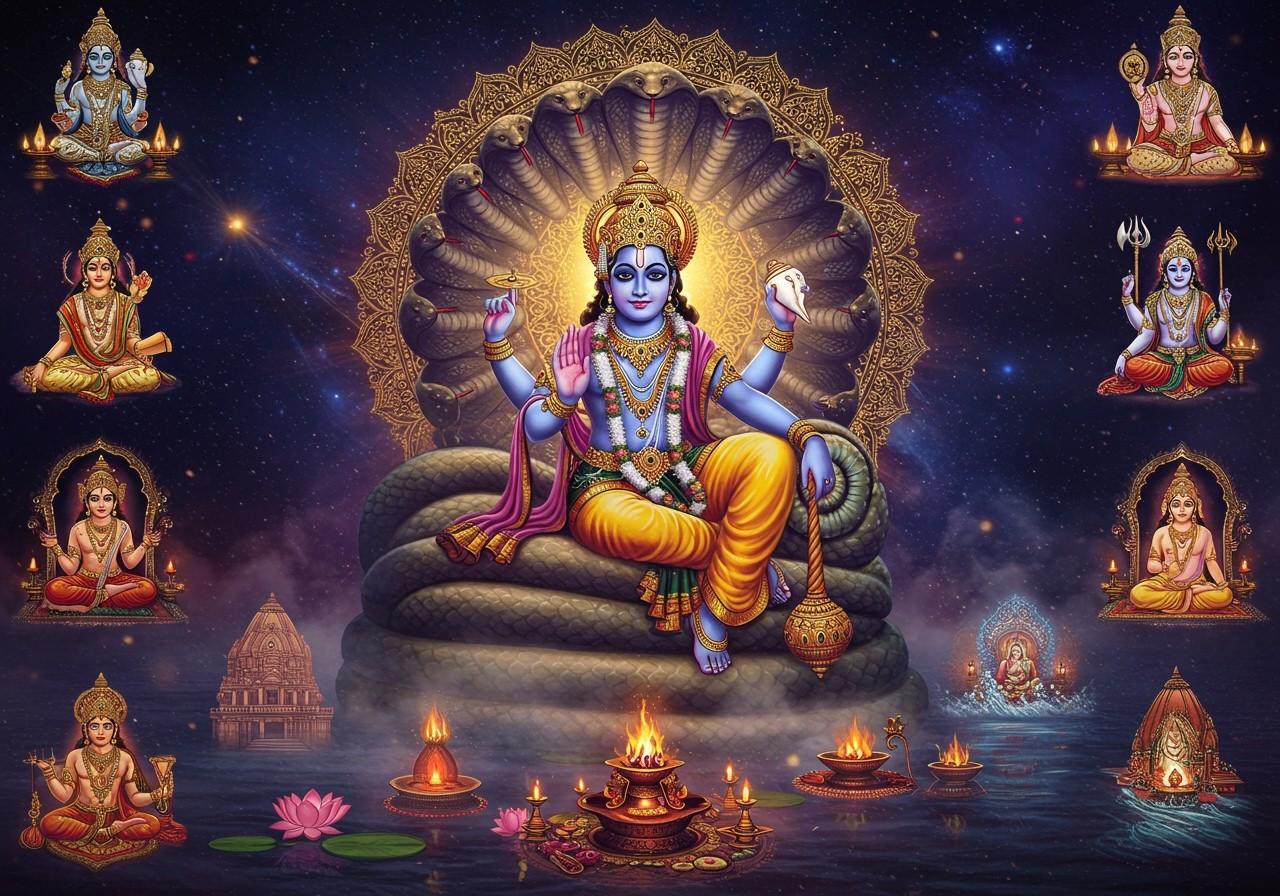
Hinduism, a profound and ancient faith, shapes the lives of millions. It transcends mere rituals, encompassing a vast spectrum of philosophies and practices. This inherent diversity makes Hinduism adaptable and deeply influential in everyday life.
Significance of Hindu Scriptures
Hindu scriptures are the bedrock of this faith. The Vedas, Upanishads, and Bhagavad Gita are pivotal texts that guide Hindu philosophy and practice. They offer profound insights into the nature of reality, the self, and the path to spiritual liberation. These sacred texts illuminate the core principles of Hinduism and provide a framework for understanding the universe and one’s place within it.
- Vedas: Considered among the oldest religious texts, the Vedas, particularly the Rigveda, offer a glimpse into early rituals, hymns, and the nascent stages of Hindu spiritual thought. They are a testament to the enduring power of ancient wisdom and provide a foundation for later philosophical developments.
- Upanishads: These philosophical treatises delve into the nature of reality, consciousness, and the self. They explore the relationship between the individual soul (Atman) and the ultimate reality (Brahman), forming the basis for many schools of Hindu philosophy. The Upanishads encourage introspection and contemplation as pathways to spiritual understanding.
- Bhagavad Gita: A cornerstone of Hindu thought, the Bhagavad Gita serves as a spiritual guide, offering teachings on duty (dharma), righteousness, and devotion. It explores the complexities of human existence and provides practical advice for navigating life’s challenges with wisdom and integrity.
These texts provide ethical guidance and spiritual enlightenment, serving both religious and philosophical purposes. They are not merely religious doctrines but also sources of profound wisdom that can enrich the lives of all seekers of truth.
Exploring Diverse Philosophies within Hinduism
Hinduism’s diversity is one of its greatest strengths. It embraces a wide range of philosophical perspectives, catering to different temperaments and approaches to spiritual understanding. Let’s explore some of the key schools of Hindu philosophy:
- Samkhya: This dualistic school distinguishes between consciousness (Purusha) and matter (Prakriti). It emphasizes understanding the interplay between these two fundamental realities as a means to achieve liberation (moksha). Samkhya provides a framework for understanding the nature of existence and the path to spiritual freedom.
- Yoga: While often associated with physical postures (asanas), Yoga philosophy delves much deeper. It focuses on the mind-body connection, utilizing meditation, ethical discipline, and physical practices to achieve self-realization. Yoga offers a holistic approach to well-being, integrating physical, mental, and spiritual development.
- Nyaya: This school emphasizes logic and reasoning as tools for acquiring knowledge. It provides a framework for critical thinking and rational inquiry, exploring the means by which we perceive and understand the world around us. Nyaya encourages a rigorous and analytical approach to knowledge acquisition.
- Vaisheshika: Closely related to Nyaya, Vaisheshika focuses on metaphysics and cosmology. It categorizes all of existence into substances, qualities, and actions, providing a framework for understanding the structure and composition of the universe. Vaisheshika offers a systematic approach to understanding the fundamental building blocks of reality.
- Mimamsa: Primarily concerned with rituals and dharma, Mimamsa emphasizes the importance of Vedic texts and their correct interpretation. It aims to preserve cosmic order and individual well-being through the proper performance of rituals and adherence to ethical principles. Mimamsa provides a framework for understanding the significance of ritual action within the Hindu tradition.
- Vedanta: This school explores the nature of reality and the relationship between the individual self (Atman) and the ultimate reality (Brahman). Advaita Vedanta, a prominent branch, emphasizes the non-dual nature of reality, asserting the oneness of Atman and Brahman. Vedanta offers profound insights into the nature of consciousness and the path to spiritual enlightenment.
These diverse schools reflect Hinduism’s inherent adaptability. They accommodate a wide spectrum of beliefs and practices, allowing individuals to find their unique path to spiritual enlightenment.
The Role of Temples in Hindu Society
Temples occupy a central place in Hindu culture, serving as much more than mere places of worship. They are vibrant hubs of social and cultural activity, playing a vital role in preserving traditions and fostering community cohesion.
- Spiritual Hub: Temples provide a sacred space for devotees to connect with the divine through prayer, meditation, and ritual offerings. They serve as focal points for religious festivals and celebrations, bringing communities together in shared devotion and cultural expression.
- Architectural Marvels: Many Hindu temples are architectural masterpieces, showcasing intricate carvings, symbolic sculptures, and sacred geometries. They stand as testaments to the rich artistic heritage and cultural ingenuity of Hindu civilization.
- Cultural Preservation: Temples play a crucial role in preserving traditional arts, music, dance, and other forms of cultural expression. They often host performances, educational programs, and community events that promote and celebrate these cultural treasures.
- Community Support: Temples often engage in charitable activities, providing support and resources to those in need. They serve as centers of community welfare, fostering a spirit of generosity and social responsibility.
- Economic Influence: As centers of pilgrimage and tourism, temples contribute significantly to local economies. They attract visitors from around the world, generating economic activity and supporting local businesses.
Temples ensure the transmission of cultural and religious values across generations, keeping traditions alive and vibrant in the face of societal change.
The Intersection of Tradition and Modernity
Hinduism demonstrates a remarkable ability to balance tradition with modernity. It adapts to evolving social norms and technological advancements while preserving its core values and spiritual essence.
- Technology in Worship: Online puja services and digital access to religious teachings have made spiritual practices more accessible to a global audience. Technology has enabled devotees to connect with their faith in new and convenient ways, transcending geographical limitations.
- Globalization Effects: As the world becomes increasingly interconnected, there is a renewed interest in preserving and celebrating cultural heritage. Hindu communities around the world are actively engaged in efforts to maintain their traditions amidst the forces of globalization.
- Environmental Consciousness: Ancient Hindu beliefs in the sanctity of nature resonate strongly with contemporary environmental concerns. Sustainable practices are being integrated into religious activities, promoting ecological balance and responsible stewardship of the planet.
- Youthful Reinterpretation: The younger generation plays a vital role in revitalizing Hindu traditions. They are reinterpreting ancient practices to fit modern contexts, ensuring their continued relevance and appeal to future generations.
Hinduism’s adaptability makes it a dynamic and evolving faith, capable of navigating the complexities of the modern world while remaining rooted in its timeless principles.
How Poojn.in Helps You Connect with Hindu Traditions
At Poojn.in, we offer a wide selection of authentic puja items and resources to support your practice of Hindu traditions. Whether you are seeking items for daily worship, special ceremonies, or exploring the rich symbolism of Hindu deities, we have something to offer. Learn more about Hindu Gods and Goddesses here.
Explore our collection of high-quality puja items, including:
- Pure copper kalash: Browse our Kalash collection
- Brass bells: Find the perfect bell for your puja
- Traditional cotton wicks: Shop for wicks and other puja essentials
- Pure ghee: Explore our range of pure ghee
- Sandalwood paste: Find authentic sandalwood products
- Fresh kumkum: Shop for kumkum and other ritual items
Visit Poojn.in to discover a wide array of traditional puja items and embark on a journey of authentic Hindu practice. For those interested in learning more about Hindu rituals and their significance, we recommend reading Hindu Rituals: Significance and Importance. We also offer a deeper look into Sacred Offerings in Hindu Rituals: Their Importance and Meaning.
Embracing the Tapestry of Hinduism
Hinduism’s rich tapestry weaves together diverse philosophies, vibrant temple culture, and a seamless blend of tradition and modernity. It embraces a wide spectrum of beliefs and practices, offering paths for spiritual growth that resonate with individual seekers. From the ancient wisdom of the Vedas and Upanishads to the contemporary interpretations of dharma and karma, Hinduism continues to evolve while remaining deeply rooted in its timeless principles. You can explore the core beliefs and practices of Hinduism in our detailed guide: Exploring Hinduism: Core Beliefs and Practices.
As the world becomes increasingly interconnected, Hinduism’s message of unity, tolerance, and spiritual self-discovery holds greater relevance than ever before. It offers a path towards inner peace, ethical living, and a deeper understanding of ourselves and the universe around us. Discover more about India’s spiritual heart in our blog post: Beyond the Temple: India’s Spiritual Heart Revealed.
FAQs: Beyond the Rituals: Hinduism’s Rich Tapestry Explained
What is the significance of Hindu scriptures? Hindu scriptures, such as the Vedas, Upanishads, and Bhagavad Gita, serve as foundational texts that guide Hindu philosophy, rituals, and spiritual practices. They offer profound insights into the nature of reality, the self, and the path to liberation. Learn more about the sacred texts of Hinduism here.
How do Hindu philosophies differ from each other? Hinduism encompasses a diverse range of philosophical schools, each offering a unique perspective on the nature of reality and the path to spiritual realization. Some emphasize dualism, while others advocate for non-dualism. Some focus on devotion (Bhakti), while others prioritize knowledge (Jnana). This diversity allows individuals to find a path that aligns with their temperament and spiritual inclinations.
Why do temples play a crucial role in Hindu society? Temples are not only places of worship but also serve as vital community centers, playing a crucial role in preserving cultural traditions, fostering social cohesion, and promoting acts of charity and service. They are spaces where individuals connect with the divine, celebrate religious festivals, and engage in acts of devotion and community building. For a deeper understanding of Hindu temples, explore our guide to their significance.
What are the main goals of life in Hinduism? Hinduism traditionally outlines four main goals of life: Dharma (duty/righteous conduct), Artha (material prosperity), Kama (pleasure/fulfillment of desires), and Moksha (liberation/spiritual freedom). These goals, known as Purusharthas, provide a framework for a balanced and fulfilling life, encompassing both material and spiritual aspirations. Learn more about Dharma and Karma in Hinduism: Dharma and Karma in Hinduism Explained.
How does Hinduism view the concept of God? Hinduism embraces a complex and multifaceted understanding of the divine. While acknowledging a single supreme reality (Brahman), Hinduism also recognizes a multitude of deities who represent different aspects of Brahman. This allows for diverse forms of worship and personal connection with the divine.
What are some common Hindu rituals? Hindu rituals encompass a wide range of practices, including daily prayers, temple worship, festivals, life-cycle ceremonies (samskaras), and devotional offerings. These rituals serve to connect individuals with the divine, express gratitude, seek blessings, and mark important life events. Delve into the rich traditions of Bhajans and Kirtans: Bhajans and Kirtans: A Deep Dive into Rich Traditions.
Why is the idea of karma important in Hinduism? Karma, a fundamental concept in Hinduism, emphasizes the principle of cause and effect. It suggests that our actions have consequences, both in this life and future lives. Understanding karma encourages ethical behavior, personal responsibility, and the pursuit of spiritual growth. Explore the concept of connecting with your inner self through Hindu philosophy: Connecting with Your Inner Self: A Hindu Philosophy Guide.


